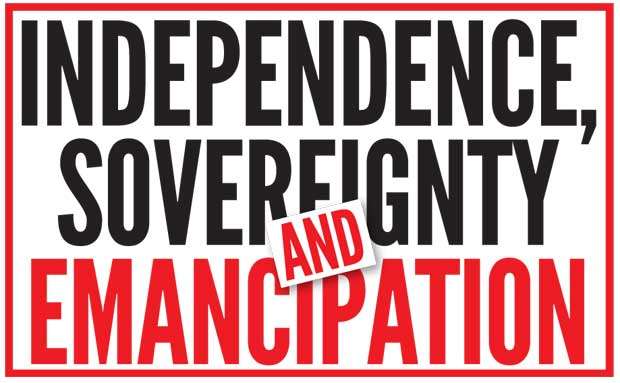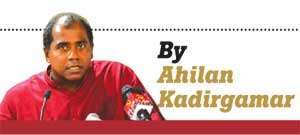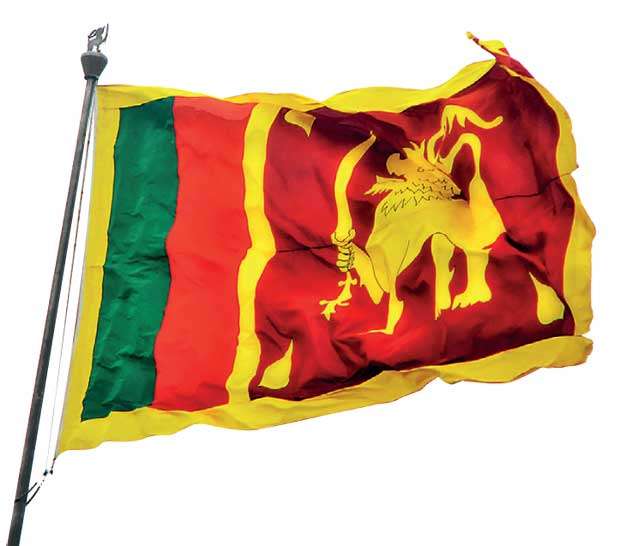Reply To:
Name - Reply Comment
Last Updated : 2024-04-17 02:11:00

 f Independence Day on February 4 is about a deeply political moment from our past, our current political moment is characterised by deep political divisions and disarray. Ethnic polarisation as well as class, gender and caste oppression are symptomatic of the divides in our society. Furthermore, not only is our representative politics in disarray with parliament pulled in different directions, even at the helm or state power, there is a chasm between the President and the Prime Minister.
f Independence Day on February 4 is about a deeply political moment from our past, our current political moment is characterised by deep political divisions and disarray. Ethnic polarisation as well as class, gender and caste oppression are symptomatic of the divides in our society. Furthermore, not only is our representative politics in disarray with parliament pulled in different directions, even at the helm or state power, there is a chasm between the President and the Prime Minister. 
The current malaise of our divided society is linked to the country’s direction after independence, where the colonial structures of inequality and oppression continued. Even worse, there was the unforgivable disenfranchisement of the Up-Country Tamils soon after independence in 1948. While independence after centuries of colonial rule brought central importance to the idea of sovereignty, our tragic history is one where the first major exercise of sovereign power was to emasculate the citizenship of a people, who over the previous century had been horrifyingly uprooted and exploited by British colonialism.
Reflecting back on our independence and looking at our future, how do we think about political freedom? Can sovereignty continue to be the central organising concept of politics or is there a need for new paths of emancipatory politics?

While we like to believe in sovereignty of the people, and we think of sovereignty as the collective rights and their exercise by the people, in reality the concept of sovereignty has a troubled past with the emergence of modern states. As political philosopher Richard Tuck has shown, it is amidst the formation of the laws of war and peace during the early modern period fraught with wars in the Europe that sovereignty as a concept about the rights of modern states emerged. And it is as an afterthought and as a legitimising move that individuals were considered to have rights and their collective will expounded as sovereignty. In reality to this day, sovereignty continues to be about wars, rule and those who wield state power.
In this context, the question inevitably arises about the importance of Third World sovereignty, of formally colonised countries and their claim to freedom. Here as Sri Lankan legal scholar Antony Anghie has shown in his important work, ‘Imperialism, Sovereignty and the Making of International Law’, sovereignty is circumscribed by international law, and international law itself was created in the imperialist and colonial engagement forming unequal treaties that underlay centuries of exploitation and extraction of the colonised world by Western powers.
Thus sovereignty in its formation, development and expansion has been a problematic legal concept. While for Third World countries in particular their formation required serious engagement with the idea of sovereignty, their postcolonial future has been tragically trapped by the exercise of sovereign power. In other words, the exercise of sovereign state power has often undermined the interests of the people.
At the current moment independence and sovereignty are again points of contention and assertions. Former Chief Minister and Supreme Court Justice C. V. Wigneswaran has put his weight behind the call for a day of protest on Independence Day. Significantly, the rational for his call is to send a message to international actors and mobilise international intervention around claims of violations of international law. Crudely mobilising international law and power, without reflecting on the continuities with colonial and imperial power are not limited to the narrow Tamil nationalists—many NGOs for human rights and other issues do the same. There are the burst of statements and advocacy that lead up to the UN Human Rights Council sessions in Geneva, however, there is little recognition of how that process is manipulated by US imperial power.
"If we want freedom to be meaningful, our search for alternatives for a more equal and just society has to begin again"
In this context, successive governments, whether led by Sirisena, Wickremesinghe or Rajapaksa peddle the concept of sovereignty, but in reality even as they exercise sovereign state power to discipline the people, they open the neoliberal gates of external extraction that also serve the national elite classes who back the leadership in power. That is what we are now facing with efforts to privatise education and healthcare. Ironically, the Rajapaksa camp who are now positioning themselves as the champions of sovereignty, a decade ago initiated and decked the sale of sovereign bonds, which the Government is now trying to repay or roll over with the sale of more such sovereign bonds.
On Independence Day in particular, sovereignty will be all present and in display with the celebrations. However, sovereignty has been as big a part of our problems and has little promise to shape a progressive future. And it is not just sovereignty, but in recent decades it is also neoliberal ideas of organising society and developing the economy that are either imposed or imitated, resulting in tremendous inequalities and devastating dispossession affecting the people.
As Frantz Fanon asked in his profound work ‘The Wretched of the Earth’ in 1961, at a time when African countries were gaining independence, will the Third World merely continue to imitate Europe or will it imagine a different future? If we are to merely follow the modern states in the West as we have done over the last many decades, we might as well have remained under colonial rule as we are unlikely to do what they have done for centuries better than them. But we know the devastation they brought through colonialism, slavery, world wars and the unequal polarised international order they have built. Retreating into the idea of sovereignty and for that matter development regimes proliferated by the West will be more of
the same.
If we want freedom to be meaningful, our search for alternatives for a more equal and just society has to begin again, but not just from a nativist critique of the international order. Rather, we should also recognise the tragedy of Sri Lanka we have created over the last seven decades. Emancipation will neither come from Geneva nor by asserting our sovereignty—it requires the transformation of our social relations, attacking the oppressive structures of class, gender and caste, even as we seek to build a plural and democratic society.

Add comment
Comments will be edited (grammar, spelling and slang) and authorized at the discretion of Daily Mirror online. The website also has the right not to publish selected comments.
Reply To:
Name - Reply Comment
On March 26, a couple arriving from Thailand was arrested with 88 live animal
According to villagers from Naula-Moragolla out of 105 families 80 can afford
Is the situation in Sri Lanka so grim that locals harbour hope that they coul
A recent post on social media revealed that three purple-faced langurs near t

10 Apr 2024
09 Apr 2024